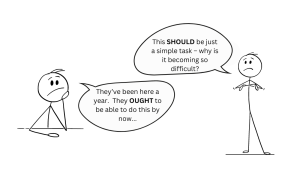Two words that say you have an accountability and responsibility problem – and how to solve it…
by Karen Amos
As I coach, I am trained to listen. I mean REALLY listen. Not just to the narrative, but to those key words from my clients that pop up without thinking, but that tell me so much.
There are two words I hear so often from managers at all levels and when I do, my little coach radar pings into action. (It’s like ‘spidey-sense’ without the cool outfit and wall climbing!)
The two words?
SHOULD and OUGHT
I’m sure you’ve said this – I certainly have and when I’ve done so it’s usually with a sense of exasperation at someone – and invariably due to something they haven’t done right, or at all.
You know how it goes…
‘They’ve been here a year. They OUGHT to be able to do this by now…’
‘This SHOULD be just a simple task – why is it becoming so difficult?’
These sentences are often accompanied by other words such as…
‘It’s obvious…’
‘It’s common sense…’
My late and much-missed friend and mentor used to say, ‘The problem with common sense is it’s not that common!’
What all these phrases tell me as a coach is:
- There are some assumptions being made
- There is a gap between desired and actual performance
- There’s a lack of communication somewhere
So before you descend into full tearing your hair out stage (or your preferred method of manifesting stress and frustration), why not take a coaching approach to find out what’s REALLY going on?
At first glance, this is a counterintuitive approach. Someone is doing something they shouldn’t, so we’re not going to tell them what to do, we’re going to ask questions instead. Huh? Isn’t that just letting them off the hook? Just the opposite actually…
Here are a few coaching questions to start you off…
- Am I sure the other person knows what is expected of them?
- How do I know this – what’s my evidence?
- Have I spoken to the person about this? (NB: Dropping in vague or sarcastic hints in the hope they will ‘get it’ and suddenly change their behaviour does not constitute ‘speaking to’ someone.)
- Are there clear and consistent standards regarding processes and work across the whole organisation?
- Do you know the reason or cause of the problem?
By putting aside our assumptions, we can build on the answers to these questions to set out a clear plan of action moving forward. And the best bit? You can’t lose with this approach. You work with the person to find the solution and if it works, well the job’s a good ‘un as they say round these parts.
And if it doesn’t work? Well you now have evidence to commence formal capability or performance management measures should you need to. At the very least you’ve clearly set out expectations and standards in your own organisation or team.
If you’d like to help yourself or your managers to build accountability and responsibility in your teams, we offer down-to-earth, practical support from online and face-to-face training sessions, to 1-to-1 and team coaching sessions. Check out our training pages using the links below for more information.
Or why not EMAIL US, or book in an informal chat using the button below. We’ll find out about the support you need and provide you with a no-obligation quote.
 Karen Amos is an executive coach and Director and Founder of BrightBird Coaching & Training. She supports business owners, managers and education leaders to get the best out of themselves and their teams. She brings a down-to-earth approach to improving working lives through better leadership, communication and working relationships.
Karen Amos is an executive coach and Director and Founder of BrightBird Coaching & Training. She supports business owners, managers and education leaders to get the best out of themselves and their teams. She brings a down-to-earth approach to improving working lives through better leadership, communication and working relationships.
Tel: 07714 855757 or email: [email protected]
You May Also Like
Tips to Overcome the Hidden Barrier to Successful Conversations…
June 12, 2025
Embarrassment and shame are powerful emotions that can derail any…
Feeling Nervous Around Difficult Conversations? Try this…
May 29, 2025
A common barrier to successful difficult conversations is our feeling of…
Balancing support and challenge in difficult conversations…
March 19, 2025
A frequent question, is how to tackle a difficult issue with staff and still…
Changing Mindsets to Workload and Wellbeing…
February 22, 2025
A coaching approach to wellbeing and time management allows teams to develop…






